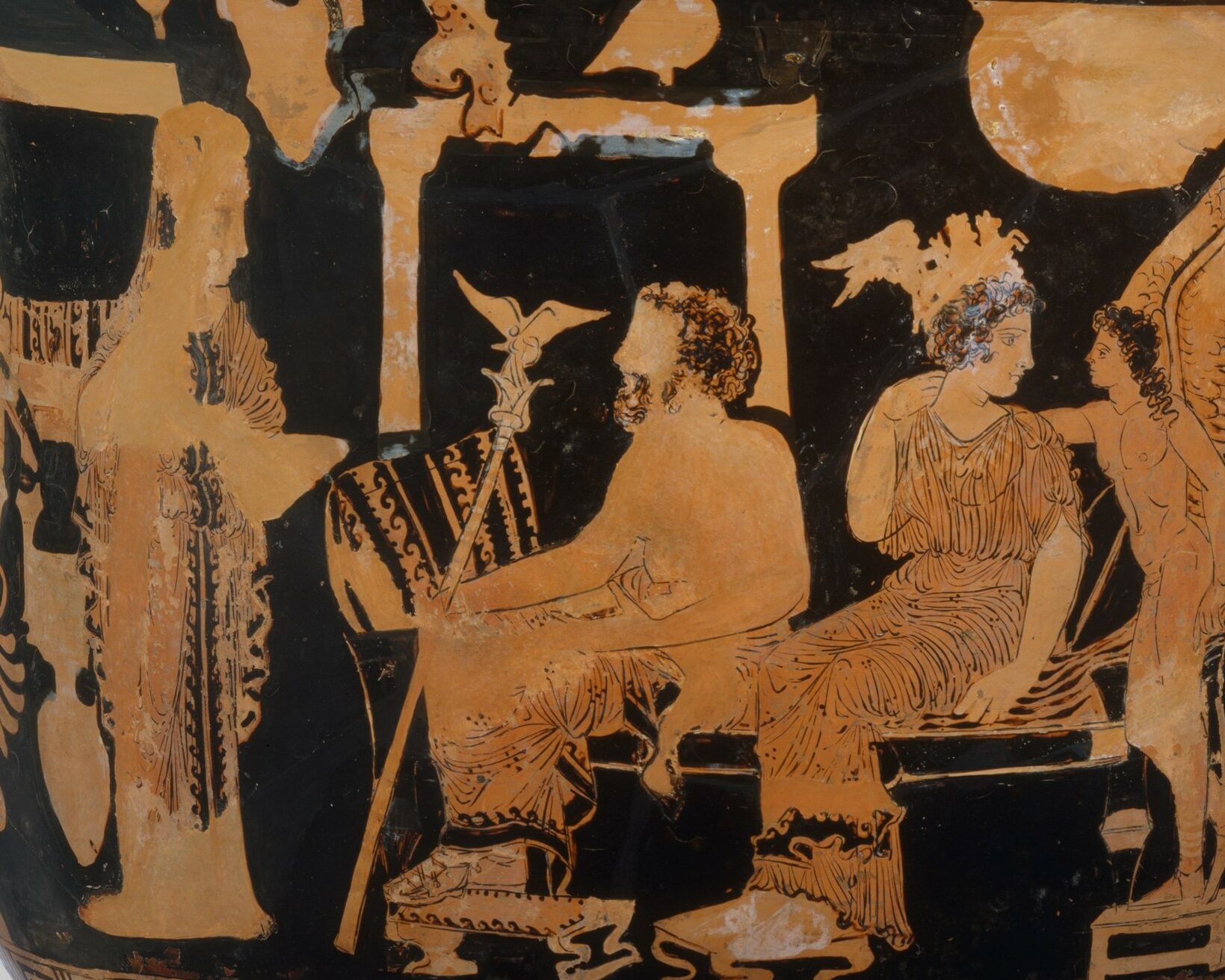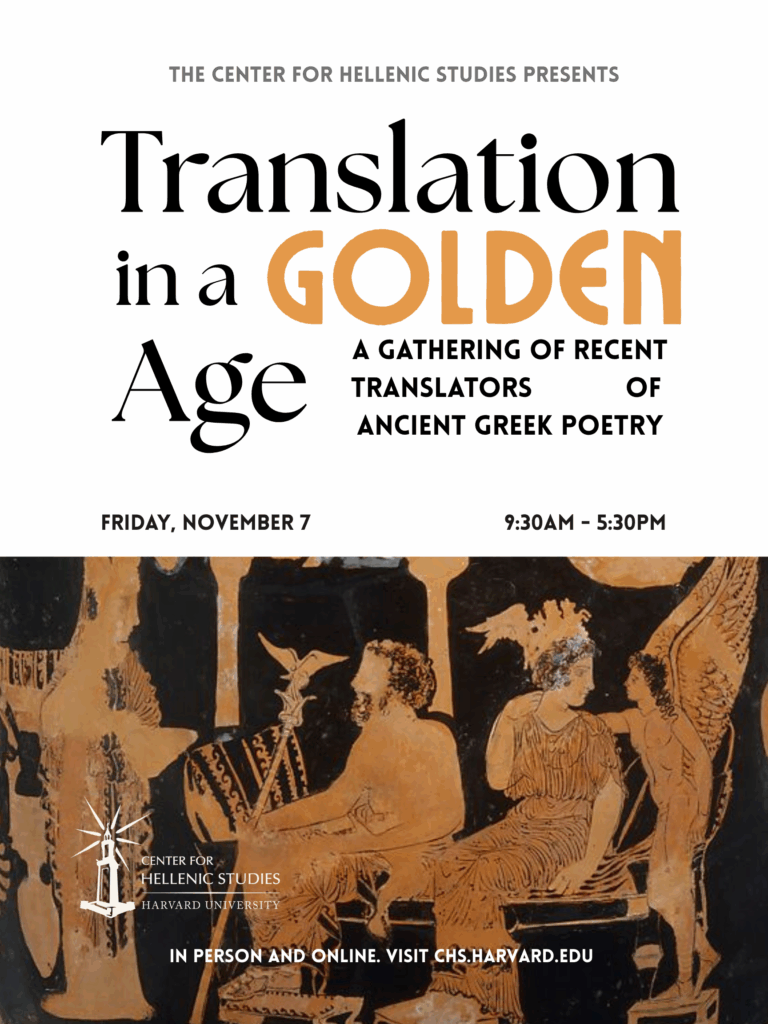
A Gathering of Recent Translators of Ancient Greek Poetry
Note: Due to unavoidable circumstances, we have revised the schedule of session 3, “Homer Now.” Thank you for your understanding.
Date: Friday, November 7, 2025
Time: 9:30am – 5:30pm EST
Location: Center for Hellenic Studies
3100 Whitehaven St. NW, Washington, DC 20008
Over one full day at the Center for Hellenic Studies in Washington, DC, Translation in a Golden Age will gather together several translators, scholars, performers and producers of ancient Greek poetry for contemporary audiences. This colloquium is mostly but not exclusively devoted to translations of Homer, traditionally held to be the first epic poet in the Western tradition.
Homer is enjoying a popular moment, whether in cinema or amongst political movers and shakers in the Western world. And it is a golden age indeed for the reader of ancient Greek poetry, spoiled with new versions, by women and by men, out of Africa, North America and from around the world. This event celebrates the wealth of new voices rendering ancient Greek epic and drama in the English-speaking world today. It will include not only discussions by translators but between them, and readings from their work by other scholars and professional performers.
A morning session will explore Aldo Braibanti’s 20th Century, Italian Philoctetes; a recent production of Aristophanes’ Lysistrata set in the deep south of the USA; African strategies for translating Aristophanes in America today; and performing tragedy and Homer in communities and onstage.
But the larger part of the event is devoted to the work of four distinguished, recent translators of Homer into English: Caroline Alexander, Daniel Mendelsohn, Richard Whitaker, and Emily Wilson. These outstanding scholars and translators will discuss their work of translation, the challenges and opportunities involved in bringing their projects to fruition and in revising them, and their thoughts on this creative and scholarly undertaking.
Register
To register for in person attendance, email Olivia Henderson at ohenderson@chs.harvard.edu. Please note that seating is limited and will be granted on a first come first serve basis.
Schedule
9:30–9:45 a.m.: Opening Remarks
Session 1: Translating Greek Drama for Contemporary Performance (9:45–11:45 a.m.)
Chair: Niall Slater
9:45–10:10 a.m.: Mario Telò, “Grooming, Tragedy, and the Prison Industrial Complex: Translating Sophocles’ Philoctetes.”
10:10–10:35 a.m.: Paul O’Mahony, “Tragedy in Communities and Homer Onstage”
10:35–10:50 a.m.: Break
10:50–11:15 a.m.: David van Schoor, “Lysistrata Americana: Between Translation & Adaptation”
11:15–11:40 a.m.: Park Krausen, “In Conversation: Producing a New Lysistrata for Performance in 2025”
11:40–11:45 a.m.: Niall Slater, Concluding remarks
Session 2: Homer Out of America, Homer in Africa (11.45 a.m.–12.30 p.m.)
Chair: Nandini Pandey
11:45 a.m. – 12:25 p.m.: Caroline Alexander, “On Translating Homer – Again”
12:25–12:30 p.m: Park Krausen, Reading of selected passages
12.30–1.30 p.m.: Lunch
Session 2 Continued: Homer Out of America, Homer in Africa (1:45–2:30 p.m.)
Chair: Nandini Pandey
1:45–2:25 p.m.: Richard Whitaker, “Translating Homer in Africa”
2:25–2:30 p.m.: David van Schoor, Reading of selected passages
Session 3: Homer Now
Chair: Suzanne Lye (2:30–4:00 p.m.)
2:30–3:10 p.m.: Emily Wilson, “Re-translating Homer, Again and Again”
3:10–3:15 p.m.: Paul O’Mahony, Reading of selected passages
3:15–3:35 p.m.: Readings from Daniel Mendelsohn’s Odyssey
3:35–3:50 p.m.: Break
Session 4: Discussion
Chair: Louise Pratt
3:50–5:00 p.m.: Questions, conversations, general discussion between translators
5:00 p.m.: Closing remarks
Following the event, in-person attendees may join a reception with readings from works discussed during the day.
Cover Image
This vase painting depicts the goddess Europa begging Zeus to prevent the hero Sarpedon—her son, according to one tradition—from being struck down at Troy. The vessel (MET 16.140) is thought to refer to a lost play by the fifth-century BCE tragedian Aeschylus. But the story of Sarpedon’s death gets an earlier, quite different telling in Homer’s Iliad. In this epic poem, Europa does not figure into the story at all: the hero’s mother is Laodamia.
The image highlights both epic poetry and drama, which will both figure into our program. It also speaks to themes at the heart of this conference: adaptation and the richness that arises from contrasting versions of same tale.

